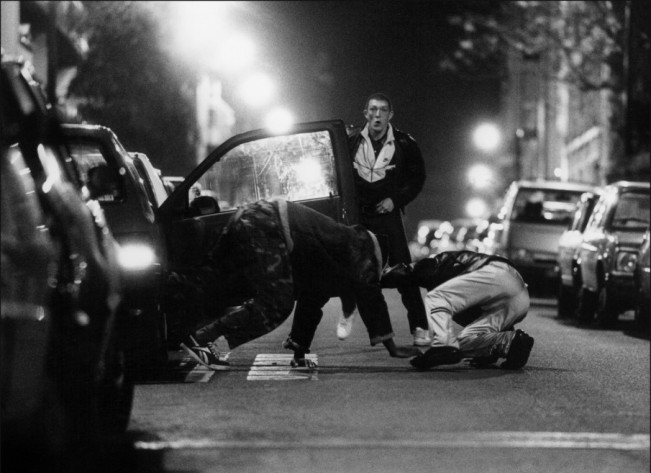

By Mike Wilmington Wilmington@moviecitynews.com
Wilmington on DVDs: La Haine
CO-PICK OF THE WEEK: CLASSIC
LA HAINE (Three and a Half Stars)
France: Mathieu Kassovitz, 1995 (Criterion Collection)
La Haine. Three street-tough, street-wise young guys from the banlieue (in the poorer districts and projects outside Paris)—a French Jew named Vinz (played by Vincent Cassel), an African, Hubert (Hubert Kounde) an Arab, Saïd (Saïd Taghmaoui)—wake up one morning, hook up with each other, hit the streets. The night before, there was a widely-reported police shooting, of a young beur, or second generation North African, and it’s made them all edgy. Vinz is boiling. Said is irritable. Hubert, a boxer, is the level-headed one, cooler.
They’re volatile, but good buddies, with no time for sentiment. They hang out. They get into fights. They find a gun. (Not as easy in Paris, but…) They ride to Paris on the train, look up some outlaw buddies. Eventually, night falls. Death or danger are imminent: one of the guys maybe , or more, or maybe somebody else. We can feel a cold breath stirring the air. A bad wind. France. Paris. The banlieue. 1995.
La Haine (or Hate) is the legendary ’95 feature debut of the young French actor turned writer-director Mathieu Kassovitz (in his 20s when it was released, as were his three leads), who based his story on the chaos and death of real shootings, and real riots, and real deaths in the early ‘90s, which he witnessed. It is a remarkable movie, with a hypnotic grip. It burns itself into your memory. The actors are unforgettable. The black-and-white, classically framed photography (by Pierre Aim and camera operator Georges Diane) is haunting, searing. The theme is anti-violence. The action stings.
Only the dialogue, which seems at least partly (and maybe wholly) improvised, is an occasional drawback. It sometimes sounds more like three good young actors, riffing off each other in real surroundings, rather than three street kids, talking trash—though not oddly enough in the most artificial moment of all, when Vinz borrows Robert De Niro’s “You talkin’ to me?” diatribe from Taxi Driver and hurls it at a mirror. That’s where we can see that, for this movie, for these moviemakers and actors, Brando and Scorsese and De Niro are as important as the fire all around them. No wonder Jodie Foster loves La Haine.
Time has passed. The streets are more violent. La Haine has survived. Kassovitz has never improved on it—yet. That’s because, even if this movie isn’t totally real, it makes you feel a kind of reality, feel as if you’re in a banlieue of the mind, as if you can see the world that Kassovitz and his guys dreamed up, in the hour before dawn. The light. You wake up. You find your friends. You hit the streets. Hate is a dog at your heels, a gun on the street, a drumbeat, a heartbeat, a scream. Someone is shot. Someone will die. But when? How? Why? Where are we? Paris… La Haine. (In French, with English subtitles.)
Extras: Commentary by Kassovitz; Introduction by Jodie Foster; Documentary Ten Years of La Haine; Deleted and extended scenes, with afterwords by Kassovitz; Production footage; Behind-the-scenes photo gallery; Booklet with an essay by Ginette Vincendeau and an appreciation by Costa-Gavras.















